“Poverty has nothing to do with money” – John Hope Bryant
I heard this quote for the first time last Wednesday at the Detroit Policy Conference. To some, this may sound counter-intuitive, but it resonated with me immediately. Growing up in a single parent family without higher education, household income below the government-defined poverty level was never far from reality. However poverty is actually so much more than a number measured by the US Census Bureau statistics.
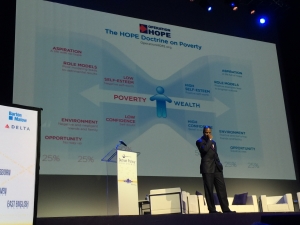
According to Bryant, poverty is actually “determined” by level of self-esteem and confidence, access to role models and opportunity, environment, and aspiration. The level of many of these key factors is extremely low in poor communities, contributing to the endless cyclical nature of poverty.
The conference focused on addressing city-wide issues from the lens of the city’s neighborhoods and this was just one of the many topics covered including the importance of financial literacy, remarks on the Flint water crisis from the Lt. Governor of Michigan, an interview with Washington Post journalist and Best-Selling author of “Once in a Great City, a Detroit Story,” a moderated discussion with the City of Detroit Mayor Mike Duggan, and a panel discussion on inclusion and gentrification with former City of Detroit Mayor Dave Bing. There were also featured segments from local community leaders including the Chairwomen and CMO of an Investment Group and Director of a non-profit alliance created to assist with inclusive revitalization efforts in the Livernois corridor.
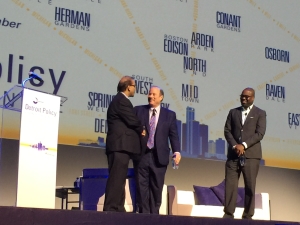
In addition there were several breakout sessions on various topics such as Sustaining Neighborhoods through Revitalization Efforts, Rebuilding Detroit through Homeownership, Taking a Legislative Approach to improving Detroit Public Schools, and Combatting the Digital Divide in Detroit. I attended panels on Connecting Communities through Regional Transit and Building Safe Neighborhoods.
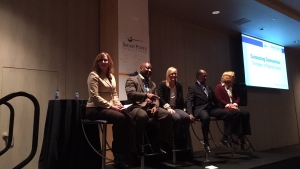 During the Regional Transit session, we discussed that current state of transportation, the challenges with Michigan’s “opt out” system (meaning any county can choose to opt out of allowing the regional transit system to stop within its borders), and plans to improve the system which is dependent upon passage of a milage next November to fund the infrastructure. The panelists consisted of the CEO of Regional Transit for Southeast Michigan who is in the process of developing regional infrastructure, Managing Director of Community Development for Kresge Foundation, one of the core donors of Detroit’s new light rail system, Executive Director of nonprofit Advancing Macomb and Government Relations for Detroit Regional Chamber, and pastor of a local Baptist Church. The panel effectively provided many different viewpoints; the importance of public private partnerships through the eyes of non profit leaders, the harsh reality of how intentional lack of a cohesive transit system has perpetuated racial segregation, and the hopeful outlook on the future of a connected, cohesive regional transit system.
During the Regional Transit session, we discussed that current state of transportation, the challenges with Michigan’s “opt out” system (meaning any county can choose to opt out of allowing the regional transit system to stop within its borders), and plans to improve the system which is dependent upon passage of a milage next November to fund the infrastructure. The panelists consisted of the CEO of Regional Transit for Southeast Michigan who is in the process of developing regional infrastructure, Managing Director of Community Development for Kresge Foundation, one of the core donors of Detroit’s new light rail system, Executive Director of nonprofit Advancing Macomb and Government Relations for Detroit Regional Chamber, and pastor of a local Baptist Church. The panel effectively provided many different viewpoints; the importance of public private partnerships through the eyes of non profit leaders, the harsh reality of how intentional lack of a cohesive transit system has perpetuated racial segregation, and the hopeful outlook on the future of a connected, cohesive regional transit system.
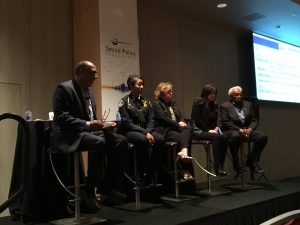 Late in the afternoon we discussed Crime and Vitality during the Building Safe Neighborhoods Panel. Speakers included the Detroit Police Department, the Michigan Women’s Foundation who has been campaigning and fundraising to process decade-old rape kits, CMO of Ideal Group which helped end gang wars in Southwest Detroit and President of a successful neighborhood patrol group in the city. It was interesting to hear a wide range of perspectives on safety with each panelist somewhat focused on different areas within Detroit. Generally, I feel fairly safe within my neighborhood. I’m not aware of a neighborhood patrol, and I can count on one hand the times I’ve seen DPD. We fall just outside the Midtown Police patrol limits (the best known campus police), but thankfully have never experienced an urgent need for law enforcement. My building is within a gated lot, secure garage, and secured entryway. And thanks to Mr. Gilbert’s investment into the two lots surrounding my building, we have constant private security monitoring our street for any unusual activity. Despite all those factors giving me a sense of security, I was impressed and surprised to hear the DPD panelists giving out her personal phone number to help.
Late in the afternoon we discussed Crime and Vitality during the Building Safe Neighborhoods Panel. Speakers included the Detroit Police Department, the Michigan Women’s Foundation who has been campaigning and fundraising to process decade-old rape kits, CMO of Ideal Group which helped end gang wars in Southwest Detroit and President of a successful neighborhood patrol group in the city. It was interesting to hear a wide range of perspectives on safety with each panelist somewhat focused on different areas within Detroit. Generally, I feel fairly safe within my neighborhood. I’m not aware of a neighborhood patrol, and I can count on one hand the times I’ve seen DPD. We fall just outside the Midtown Police patrol limits (the best known campus police), but thankfully have never experienced an urgent need for law enforcement. My building is within a gated lot, secure garage, and secured entryway. And thanks to Mr. Gilbert’s investment into the two lots surrounding my building, we have constant private security monitoring our street for any unusual activity. Despite all those factors giving me a sense of security, I was impressed and surprised to hear the DPD panelists giving out her personal phone number to help.
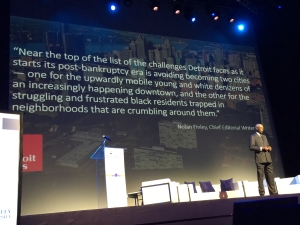
Both panels equally represented varying view points and discussed various perspectives of the issues at hand. Perhaps among the most powerful conversations was the diversity and inclusion panel. Panelists included minority business owners, the CEO of the Michigan Black Chamber of Commerce, President and CEO of the Detorit Economic Growth Corp, a Community Director for Sugar Law Center (the only female), and two media moderators. The former mayor had some positive feedback as well as some ominous cautioning to prevent the city of Detroit from facing any repeats of the race riots from the 60’s.
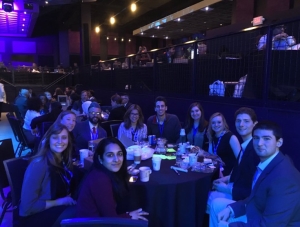
“Diversity is about counting people, inclusion is about making people count,” – former mayor Dave Bing
Despite its raw honesty, the conference was full of varying perspectives and provided a fantastic lens for residents, business owners, and other key stakeholders into the challenges facing Detroit’s economic recovery and the corresponding challenges each party faces.
There are wonderful, exciting things happening here in the city of Detroit, and the media is quick to praise them. But there’s a rich history that runs deep within the neighborhoods and it is so important for all voices to be heard as Detroit experiences a rebranding transformation.
“Anything done for us, without us, is not for us,” – panelist at Detroit Policy Conference 2016
